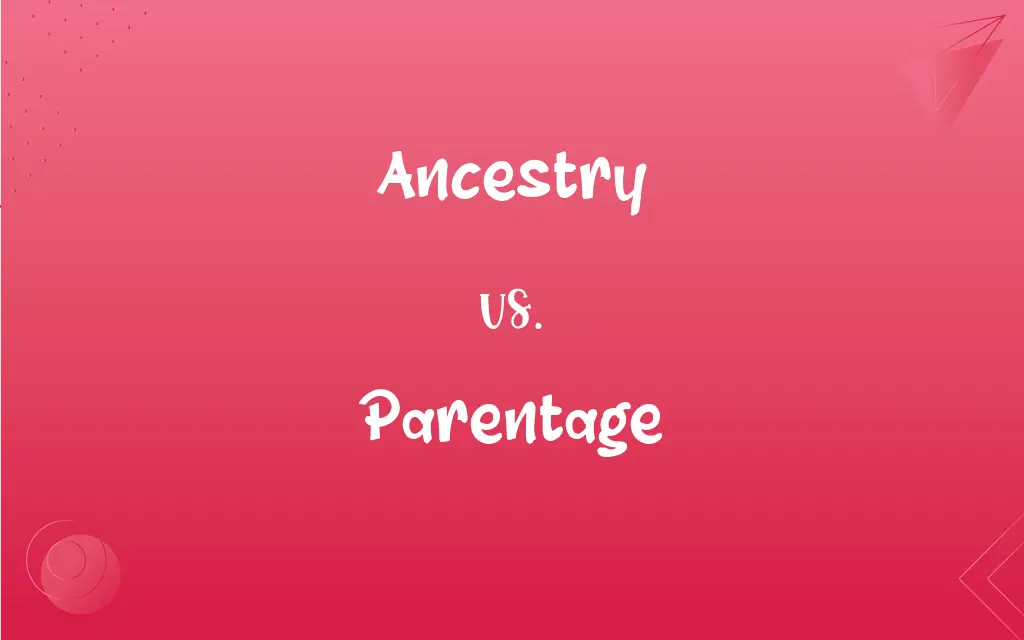Ancestry vs. Parentage: What's the Difference?
Edited by Aimie Carlson || By Janet White || Published on January 5, 2024
Ancestry refers to one's family lineage or heritage extending back generations, while parentage specifically denotes one's immediate parents and their lineage.

Key Differences
Ancestry encompasses the entire lineage of an individual, tracing back through many generations. Parentage, however, refers specifically to an individual's immediate parents and their backgrounds.
Ancestry often includes the broader cultural and ethnic heritage of an individual, spanning several ancestors and their origins. Parentage is more focused, relating to the specific identities and characteristics of one's parents.
Research into one’s ancestry involves exploring a wide range of ancestors and their connections. In contrast, research into parentage typically focuses on the direct lineage and ancestry of one's parents.
Ancestry can have legal implications in terms of heritage and rights, and also influences personal identity on a broader scale. Parentage is crucial in legal contexts like citizenship, inheritance, and familial responsibilities.
Ancestry encompasses a broader genetic heritage from multiple ancestors. Parentage is concerned with the genetic traits inherited specifically from one's parents.
ADVERTISEMENT
Comparison Chart
Scope
Broad family lineage
Immediate parents and their lineage
Cultural Significance
Encompasses wider ethnic and cultural heritage
Focuses on the identity of parents
Research Focus
Multiple generations and connections
Direct lineage and background of parents
Legal Relevance
Broader implications for heritage and rights
Pertinent in matters of inheritance, citizenship
Genetic Perspective
Wide range of genetic heritage
Specific genetic traits from parents
ADVERTISEMENT
Ancestry and Parentage Definitions
Ancestry
Ancestry is the lineage or bloodline of an individual.
Her ancestry traced back to medieval royalty.
Parentage
It specifically denotes one’s biological mother and father.
Genetic testing confirmed her parentage conclusively.
Ancestry
Ancestry includes the genetic background of a family.
Her ancestry included a unique genetic trait shared by her ancestors.
Parentage
Parentage refers to the identity of one's immediate parents.
His parentage was a topic of much curiosity in his small town.
Ancestry
Ancestry encompasses cultural and ethnic backgrounds.
His ancestry was a rich tapestry of diverse cultures.
Parentage
Legally, parentage identifies one's legal guardians or parents.
The court documents clarified his parentage.
Ancestry
It refers to the historical lineage of a family.
Researching her ancestry revealed fascinating historical connections.
Parentage
Parentage encompasses the heritage from one's parents.
Her artistic talents were attributed to her parentage.
Ancestry
It represents the lineage extending from ancestors.
His ancestry included notable historical figures.
Parentage
Parentage involves the genetic traits inherited from parents.
His parentage played a key role in his genetic health profile.
Ancestry
Ancestral descent or lineage.
Parentage
Descent from parents; lineage
Of humble parentage.
Ancestry
Ancestors considered as a group.
Ancestry
Condition as to ancestors; ancestral lineage; hence, birth or honorable descent.
Title and ancestry render a good man more illustrious, but an ill one more contemptible. -Addison.
Ancestry
A series of ancestors or progenitors; lineage, or those who compose the line of natural descent.
Ancestry
Condition as to ancestors; ancestral lineage; hence, birth or honorable descent.
Title and ancestry render a good man more illustrious, but an ill one more contemptible.
Ancestry
A series of ancestors or progenitors; lineage, or those who compose the line of natural descent.
Ancestry
The descendants of one individual;
His entire lineage has been warriors
Ancestry
Inherited properties shared with others of your bloodline
FAQs
What defines ancestry?
Ancestry refers to one's family lineage extending back multiple generations.
Is parentage limited to biological parents?
Primarily, yes, though it can also refer to legal or adoptive parents.
Is parentage important in genetics?
Yes, parentage directly influences one's genetic makeup.
What is parentage?
Parentage specifically denotes an individual's immediate parents and their backgrounds.
How does parentage impact legal rights?
Parentage can determine legal rights and responsibilities, like child support.
How far back does ancestry go?
Ancestry can go back several generations, unlike parentage which is focused on immediate parents.
Can ancestry include cultural heritage?
Yes, ancestry often encompasses cultural and ethnic backgrounds.
Can ancestry affect personal identity?
Absolutely, as ancestry contributes to one's broader cultural and familial identity.
Can one trace ancestry through DNA tests?
Yes, DNA tests can provide insights into one's ancestry.
Does parentage have legal implications?
Yes, parentage is important in legal contexts like inheritance and citizenship.
Does parentage include step-parents?
Typically, parentage refers to biological parents, but can include step-parents in a broader sense.
Does ancestry play a role in cultural traditions?
Yes, ancestry can influence the cultural traditions one follows.
How is ancestry researched?
Ancestry is researched through genealogical studies, often involving multiple generations.
Are ancestry records always accurate?
Not always, as historical records can be incomplete or inaccurate.
Is parentage important for medical history?
Yes, understanding one's parentage is crucial for medical histories.
How is parentage verified?
Parentage can be verified through legal documents or genetic testing.
Are ancestry and heritage the same?
Ancestry is part of one's heritage, but heritage also includes cultural and social elements.
Does ancestry include adopted ancestors?
Ancestry usually refers to biological ancestors, but adopted ancestors can be considered in a broader context.
Can parentage affect citizenship status?
Yes, in many countries, parentage is a factor in determining citizenship.
Can parentage change over time?
Legal parentage can change, for example, through adoption, but biological parentage remains constant.
About Author
Written by
Janet WhiteJanet White has been an esteemed writer and blogger for Difference Wiki. Holding a Master's degree in Science and Medical Journalism from the prestigious Boston University, she has consistently demonstrated her expertise and passion for her field. When she's not immersed in her work, Janet relishes her time exercising, delving into a good book, and cherishing moments with friends and family.
Edited by
Aimie CarlsonAimie Carlson, holding a master's degree in English literature, is a fervent English language enthusiast. She lends her writing talents to Difference Wiki, a prominent website that specializes in comparisons, offering readers insightful analyses that both captivate and inform.






































































